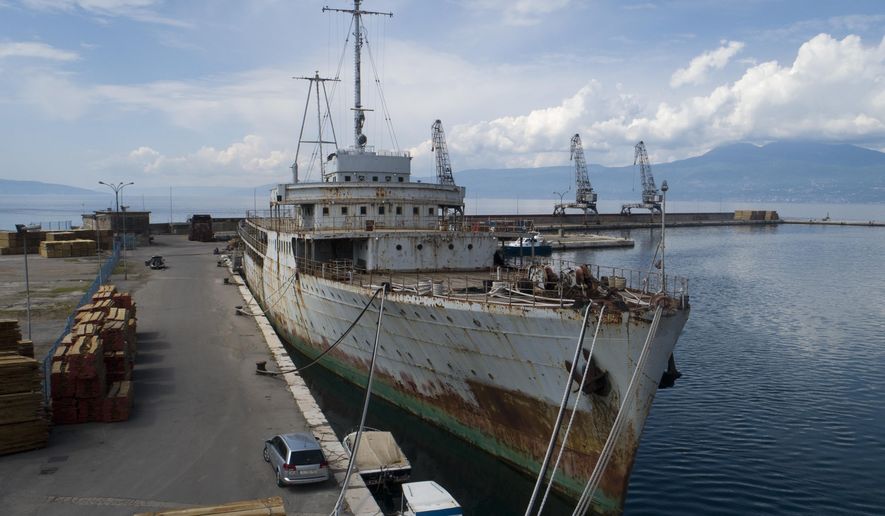RIJEKA, Croatia (AP) - Decades of rust are covering its hull, the furniture is broken in its once luxurious salons, its powerful engines are permanently idle. But against all odds, the iconic yacht that once belonged to the late Yugoslav strongman Josip Broz Tito has been given a new lease on life.
The once-imposing ship that hosted Hollywood celebrities, some 70 world leaders and took Tito up the River Thames for a historic meeting with British Prime Minister Winston Churchill will be turned into a floating museum.
The ship, called Galeb, or Seagull, is moored at the northern Croatian Adriatic port of Rijeka. After its turbulent history, including two sinkings since it was launched in 1938 and a failed purchase by a Greek tycoon, it was destined for a junkyard.
But authorities in Rijeka, the city that has been chosen by the European Union to be the European Capital of Culture in 2020, decided to completely refurbish it in a 5.4 million euro ($6.4 million) project that will start in 2019.
“Galeb is a ship with very interesting and turbulent history,” Rijeka Mayor Vojko Obersnel said. “Of course the most interesting part of that history is when it was a ship belonging to President Josip Broz Tito.”
The decision to renovate the 5,100-ton, 106-meter (350-foot) vessel has triggered anger from Croatia’s nationalists.
They blame Tito, who ruled communist Yugoslavia for 35 years until he died in 1980, for autocratic rule and for forcing Croatia to join the former federation of six republics that comprised Yugoslavia.
The boat has become a symbol of Tito’s well documented life of luxury and splendor. And his critics in Croatia want it to be destroyed.
But Obersnel says the renovation plan will go forward. “First of all, it’s our history and we cannot change that history,” Obersnel said. “During that period, we could talk about good things and maybe some not so good things. But that’s our history.”
The decaying ship hulk has been towed to an isolated dock in the harbor, with its bow pointing at downtown Rijeka, once a drab port town that is gradually becoming one of Croatia’s main tourist destinations.
“The idea of renovation is to make it a ship museum to primarily show its history, all of its life phases that were many and very interesting,” said Kristina Pavec from Rijeka’s City Museum, which is overseeing the project.
The ship’s once luxurious salons and stairways are full of broken down 1960s furniture. Torn carpets and wallpaper lines the decks and bulkheads. In his private quarters, Tito’s walk-in closet for ties, shoes and flashy military uniforms stands empty; his bed mattress is still there, but the bed is not. On the captain’s fly bridge, naval maps flutter in spring breeze and the engine order telegraph is pointing at idle.
In Tito’s era, the ship belonged to the Yugoslav naval academy. After the bloody breakup of the federation in the 1990s, it first was parked in Montenegro before being sold to Croatia for $150,000.
Built in Genoa, Italy, the ship was intended for transport of tropical fruit from Africa. During World War II, the Nazis used it as an auxiliary naval ship to lay mines. The ship was eventually sunk in Allied bombings of Rijeka’s port toward the end of the war.
After the war, it was completely reconstructed and turned into a Yugoslav naval academy training ship. A VIP bloc was added so the yacht could serve as Tito’s luxury residence on his frequent sea voyages. The crew typically included 200 sailors and some 20 VIP guests, including an orchestra that entertained them during parties.
The late president preferred it to airplane travel and used it extensively on tours to Africa, Asia, South America and Europe. It became famous in 1953 when Tito sailed into London to meet Churchill and Queen Elizabeth II as the first Communist leader to visit Britain after World War II.
World leaders entertained on the ship included late Russian leader Nikita Khrushchev, Libya’s Muammar al-Qaddafi, Egypt’s Gamal Abdel Nasser and India’s Indira Gandhi. Tito was particularly excited to welcome movie celebrities such as Sophia Loren, Elizabeth Taylor and Richard Burton, who played Tito in a 1973 war epic filmed in Yugoslavia.




Please read our comment policy before commenting.